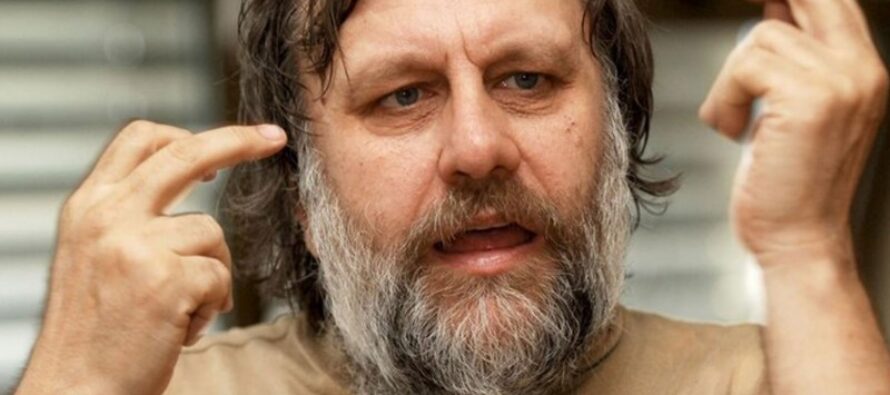Žižek: “if Europe betrays Kurds, it will betray itself”

![]()
Well known Slovenian philosopher Slavoj Žižek wrote on The Independent: “The fate of the Kurds makes them the exemplary victim of the geopolitical colonial games: spread along the borderline of four neighboring states (Turkey, Syria, Iraq, Iran), their (more than deserved) full autonomy was in nobody’s interest, and they paid the full price for it.”
Žižek added: “Do we still remember Saddam’s mass bombing and gas-poisoning of Kurds in the north of Iraq in the early 1990s? More recently, for years, Turkey plays a well-planned military-political game, officially fighting ISIS but effectively bombing Kurds who are really fighting ISIS.”
Žižek continued: “In the last decades, the ability of the Kurds to organize their communal life was tested in almost clear-cut experimental conditions: the moment they were given a space to breath freely outside the conflicts of the states around them, they surprised the world.
[…] In northern Syria, the Kurdish enclave centered in Rojava was a unique place in today’s geopolitical mess: when Kurds were given a respite from their big neighbors who otherwise threatened them all the time, they quickly built a society that one cannot but designate an actually-existing and well-functioning utopia.”
According to Žižek: “It is our duty to fully support the resistance of the Kurds to the Turkish invasion, and to rigorously denounce the dirty games Western powers play with them. While the sovereign state around them are gradually sinking into a new barbarism, Kurds are the only glimmer of hope.”
And it’s not only about Kurds, said Žižek “that this struggle is fought, it’s about ourselves, it’s about what kind of global new order is emerging. If Kurds will be abandoned, it will be a new order in which there will be no place for the most precious part of the European legacy of emancipation. If Europe will turn its eyes away from Kurds, it will betray itself. The Europe which betrays Kurds will be the true Europastan!”
The full article can be read here:
Related Articles
NUOVA INIZIATIVA DICHIARAZIONE DI BRUXELLES
![]()
In un breve comunicato firmato dal facilitatore sudafricano Brian Currin, i firmanti la Dichiarazione di Bruxelles, annunciano che hanno deciso
CONFERENZA MONDIALE DEI POPOLI IN BOLIVIA
![]()
Sono arrivati alla conclusione a Cochabamba, in Bolivia, i lavori della Conferenza Mondiale dei Popoli sul cambiamento climatico e i
GIULIO GIORELLO. L’ALTRO OCCIDENTE. UN MOSAICO DI VISIONI PARZIALI CONTRO IL PREGIDUZIO.
![]()
 TALKINGPEACE ha intervistato il filosofo e epistemologo Giulio Giorello
TALKINGPEACE ha intervistato il filosofo e epistemologo Giulio Giorello
Nonostante i dibattiti, le affermazioni di principio su pluralismo e democrazia, l’Occidente mantiene una sorta di egocentrismo culturale, una definizione di superiorità rispetto alle altre culture…
Quando sento parlare di Occidente, non so che cosa si voglia dire. Cosa intendiamo? Le famose “radici” greche come dicono alcuni? O le “radici” cristiano-giudaiche, ma quanta ipocrisia in quel trattino, e poi quale Cristianesimo? Ha marcato di più la Controriforma cattolica a sud, o a nord l’Europa protestante? E dove finisce l’Europa a est? E fin dove si espande a ovest? Quasi tutti sono d’accordo nel dire, con Fernand Braudel, che il grande prolungamento a ovest è il continente americano. Ma poi, proseguendo ancora verso Occidente, attraverso l’Oceano Pacifico, arriviamo al Giappone. La terra è rotonda. I nomi valgono per quel che valgono, sono definizioni di comodo, ma non darei loro un valore di essenza. Quando si parla di “radici”, perché non pensare, poniamo, anche alle radici vichinghe, dato che anche i vichinghi hanno avuto la loro storia? E se guardiamo alle tre grandi religioni monoteistiche, l’Islam non è stato talora il nostro “Occidente” (ricordando, per altro, che Maghreb significa appunto occidente)? Pensiamo al grande esperimento di El Andalus, un progetto di coesistenza che certo non era tolleranza in senso stretto, ma ha comunque visto fiorire insieme in modo pacifico tre civiltà: quella islamica, quella cristiana e quella ebraica. Basta andare a Cordoba per ritrovare tracce di questo progetto che poi la Spagna – dalla Riconquista dei re cattolici a Franco – ha fatto di tutto per cancellare. Occupandomi di scienza, vorrei citare una frase del grande fisico Freeman Dyson: “ Non esiste un visione scientifica unica come non esiste un visione poetica unica. La scienza è un mosaico di visioni parziali e conflittuali. In tutte queste visioni c’è però un elemento comune: la ribellione contro le restrizioni imposte dalla cultura localmente dominante Occidentale o Orientale che sia. La visione della scienza non è specificatamente occidentale. Non più occidentale quanto possa essere araba o indiana o giapponese o cinese.” Una cosa simile ha detto Amartya Sen a proposito della democrazia.

